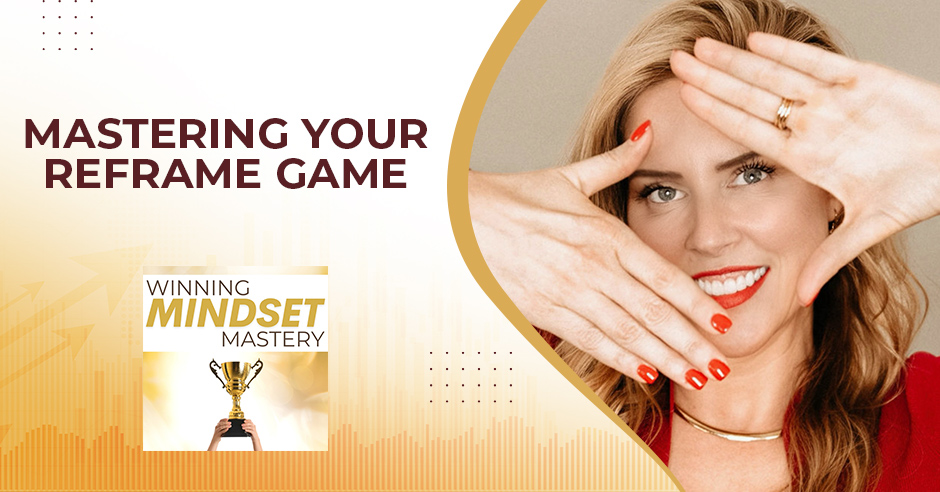
Some things in life may seem unfortunate at first, but with the right reframe game, you can turn even the most depressing situations into powerful opportunities. April Shprintz discusses how to practice reframing your mind and teach your subconscious mind to adapt even to the biggest challenges in your life.
—
Listen to the podcast here
Mastering Your Reframe Game
I am so glad you are here. If you are new, I am even happier that you are joining us. I’m going to be talking about reframing and there are great episodes about this early on, I want to make sure that we are revisiting it because it is still super helpful even if you’ve been reading for a while, because until reframing is your habit, and you’ll know when reframing is your habit, you will annoy some people or you’ll be known for it by your friends in a good way. Until then, the more you practice, the better.
A little bit of background, your unconscious mind is your unpaid assistant, and eventually, you can train your unconscious mind to reframe things for you and help you see situations as happening for you instead of to you and help you see solutions much more easily. In the same way, it helps you drive home when you are not paying attention, and it can be incredible.
Your unconscious mind is your unpaid assistant. You can train it to reframe things for you. Share on XWhen it comes to reframing, I love to tell people to start practicing with other people. Not your friends and family because you will piss them off. I mean easy things like watching TV or maybe listening to an audiobook, and you can start to reframe the situations for them until your unconscious mind starts to do it for you, even in your own life. You can reframe things as they happen to you, especially if they are not big things like maybe being stuck in traffic or a long line at the store, but it’s always better to practice with things that don’t have you highly emotional because you’ll get better at it and train your brain around it.
April’s Reframing Process
This is my process. The first thing I do is check my oven for something. What I mean by that is when I’m worked up, I’m pissed about something, I will go to 500. That broil in your oven. That’ll burn anything fast. Most things only need about 350 degrees, some things will be fine at 180 degrees. You’ve got to find where your emotions are as far as that temperature because if you are at broil, you are going to have a hard time reframing and you are going to want to ignore it, find something else to focus on and come back to it at a time when you are not so emotional.
The second thing I do, assuming I’m at 350 or below, I’m in a decent place with it. Maybe even at 400. It depends if I ask myself, “How could this be happening for me instead of to me?” It doesn’t matter if it’s an outlandish reason, and I will give you an example of this. I got my car stuck in my garage. Don’t laugh at me. I am legally blind in one eye. I have no depth perception. Sometimes parking, even with sensors and monitors can be hard for me because what I see isn’t what is there.
I had put my car in the garage so tightly. I was terrified that I was going to hit it on the way out. I was stuck in the garage. I couldn’t go to the gym. What I choose to believe about that is it saved my life. I choose to believe that happened for me instead of to me because I might’ve gotten in an accident that killed me if I left at that time of day. My best friend got my car out of the garage and he was like, “I don’t even know how you got it in there. I can’t believe I got it out without scratching it. It was close.
It doesn’t matter what the reason is, what are some reasons it could be happening to you? Sometimes it helps to call upon other times that things have worked out for you that you didn’t realize were working out for you. You knew later. When I first got into sales in one of my early jobs, I wanted to get a certain sales position working with a big, amazing company in the financial industry but did not get that role. I found out later, that the reason I didn’t get that role is because they gave it to the CEO’s daughter.
Let’s be clear. If you are going to lose out on your first sales role, going to the CEO’s daughter feels better than if you weren’t qualified. Here’s what’s interesting. Though I wanted that role, I got a different role a few months later. The role that person was in had a terrible time. The client ended up being incredibly unhappy and had tons of problems that weren’t necessarily related to her, and I ended up getting an amazing client that was in the Fortune 100 and ended up boosting my career, being incredible people to work with. On the front end, it looked like a loss. It looked like a bad thing, but it happened to me.
Focus On The Good Things
Find some of those situations in your background so that you can trust that whatever’s happening is happening for you instead of to you. If you feel better, great. You’ve done it. You reframed. Focus on something else that does feel good. Some areas of your life that you have no resistance to, no issues with, no strife, no stress, and that will keep you in a better place, and that will allow the other things to work out.
Find situations in your background so that you can trust that whatever happens to you actually happens for you. Share on XIf you don’t feel better, then you are going to think about how you can completely ignore it. This is when we talk about the oven. You are at 500 degrees or maybe you underestimated how hot your oven was and you need to completely ignore it. You are going to enlist help. My dog Cowboy seems to have a sixth sense about this when I’m having a big issue reframing something and I can’t ignore it, he immediately needs to be played with. He immediately needs a walk, or you might call a friend or go to a movie. Take a walk. Find a way to get off the subject.
I promise, that when your oven does cool down, you will be able to reframe it. It won’t seem like as big of a deal. The harder it is to think about it without feeling good, that’s the key that you know it’s the less you should think about it. Reframe it later. This is counterintuitive, but it will get more things to work out for you than if you practice reframing everything perfectly.
Finding the strength to, “I can’t get to a good place on this. I’m going to ignore it,” and then you will find that things start happening in your favor and working out for you as you are focusing on the things that you do want. Try out this reframing if you are new to it. I have earlier episodes that get down to different techniques for reframing different examples, sometimes that’s helpful when you hear it from someone else in a different situation. If you are not new to reframing and you’ve gotten lazy about it, make it something you are doing this time because I promise you. What you will get back in return for doing those reframes is double, triple, and quadruple the level of effort you put into learning this skill. You’ve got this, and I believe in you. Here’s to your success.





